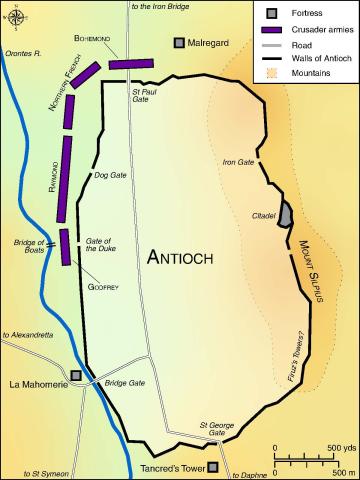The Capture of Antioch
[8.19.2] Nōn acquiēvit Tancredus; tamen perrēxit cum suīs honestissimīs mīlitibus ac servientibus, et extemplō abstulit undique viās Turcīs, ita ut nūllī audērent ex eīs, iam timōre eius perterritī, extrā urbis portam exīre; neque propter herbam neque propter ligna neque propter ūlla necessāria. Remānsit vērō ibi Tancredus cum suīs, coepitque vehementer ubīque coangustāre cīvitātem. Ipsā quoque diē veniēbat maxima pars Armeniōrum et Syrānōrum sēcūrē dē montanēīs, quī ferēbant alimenta Turcis in adiūtōrium cīvitātis. Quibus advēnit obviam Tancredus et apprehendit eōs et omnia quae dēferēbant, vidēlicet frūmentum, vīnum, hordeum, oleum, et alia huiusmodī. Sīc itaque rōbustc et prōsperē dēdūcēbat sē Tancredus, iamque habēbat prohibitās et incīsās omnēs sēmitās Turcīs, dōnec Antiochīa esset capta.
[8.19.3] Omnia quae ēgimus antequam urbs esset capta nequeō ēnārrāre, quia nēmō est in hīs partibus sīve clēricus sīve lāicus quī omnīnō possit scrībere vel nārrāre, sīcut rēs gesta est. Tamen aliquantulum dīcam.
notes
(March–April 1098) Tancred blocks the road (from St. George's Gate), thus preventing the Turks from foraging. Local Christians arrive with provisions for the city, which Tancred captures. His blockade lasts until the fall of the city.
8.19.2
tamen: CL would be et.
servientibus: serviens, technically a present participle, means “sergeant." He might fight on foot or on horseback, but was inferior to a knight in weaponry and social status.
abstulit undique viās Turcīs: "he took the roads away from the Turks everywhere." Tancred only blocked a single road, but doing so meant that none of them were open to the Turks.
ita ut nūllī audērent ... extrā urbīs portam exīre = ita ut nūllī ex eīs (= ex Turcīs), iam timōre eius perterritī, audērent exīre extrā portam urbis.
Ipsā ... diē: CL would be eādem ... diē.
donec: “until (the time that),” Tancred kept doing this until Antioch was captured; his actions were not the cause of the capture.
8.19.3
esset: CL would be indicative.
hīs partibus: the author (we infer) was writing while still in the East, perhaps in Jerusalem, in contact with others who had been with him on the crusade.
Tamen aliquantulum dīcam: our author omits the events of April and May of 1098, including a truce.
vocabulary
8.19.2
acquiescō acquiescere acqiēvī: to rest, relax
extemplō: immediately
coangustō (1): to make narrow: to confine in a small space (OLD 2); to blockade (ML)
dēferō dēferre dētulī dēlātum: to carry, transport
sēcūrē: confidently
hordeum –ī, n.: barley
oleum –ī, n.: olive oil
huiusmodi: of this sort (OLD modus 12d)
8.19.3
ēnarrō (1): to describe fully, recount
lāicus –a –um: of the people (vs. priests), lay (LL)
omnīnō: entirely
aliquantulum: somewhat, a little
aliquantulum: to a small extent

